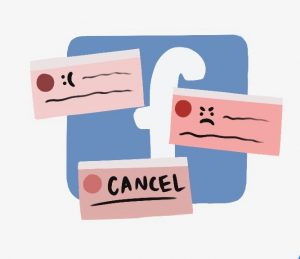Calling Out Cancel Culture
October 14, 2020

When Jonathan Groff, a writer on the hit show Black-ish, first met Louis C.K., they were working together on Late Night with Conan O’Brien. He said that while C.K. seemed to have a dark side to him, he never could have imagined the public backlash his peer would eventually face. Now, with “cancel culture” drawing worldwide controversy, Groff said he’s reevaluating how he thinks about the judgment of celebrities and their actions.
“It was very interesting how the term ‘politically correct’ became like an epithet, and it’s similar to the term ‘cancel,’ which started as a snarky shorthand for ‘I don’t want to engage with this anymore,’” Groff said. “Now it has become weaponized, where people are accusing others without nuance.”
Defining Cancel Culture
Eve Levy ’22 said that she defines this form of backlash as a phenomenon that exists largely online.
“I would say that cancel culture in my view is the mass criticism, harassment and ‘boycott’ of a person for an action deemed to be motived by bigotry via social media,” Levy said.
Common Criticisms
She said that fans and creators alike who come out against “cancel culture” mostly take issue with it because they believe it robs people of a chance to grow, change and defend themselves.
“I think that the most problematic and unproductive side of it is when it’s entirely online and driven by virtue signaling,” Levy said. “A major flaw is that people will not provide the person they are criticizing any real opportunity to improve. I also think that rather than creating accountability or any meaningful impact, people can just get caught up in the heat of the moment and disproportionately punish someone even when their impact is largely insignificant.”
Others, like Jonah Anschell ’23, said they believe that “cancel culture” is often motivated purely by political vendettas.
“I think cancel culture, while theoretically sound in certain situations, can sometimes be misappropriated and used by groups who, instead of trying to expose legitimately discriminatory or problematic organizations, businesses or individuals, use it as a political tool against those which they disagree with,” Anschell said. “It becomes more and more of a divisive and destructive tool than it is a constructive one.”
Cancel Culture’s Real Consequences
Though there are some who believe that “cancel culture” has obvious flaws, others do not consider it a major issue. Levy, for example, questions its actual impact.
“What I would classify as cancel culture mostly targets celebrities, which is why I think it can often be meaningless,” Levy said.
Other than people who have been convicted of crimes, like producer Harvey Weinstein, there have been few consequences for people who are “canceled” by the internet. Usually, their punishment is limited to mean tweets and a few weeks of public outcry. According to an article from CNN, the dust then settles and the “canceled” celebrity gets back to their career. Groff said that since he believes the victims are mostly wealthy, powerful people, the small, toxic area of the internet that might actively seek to ruin celebrities does not represent the majority. He said he believes this public outcry against “cancel culture” has culminated in the demonization of accountability.
Past Iterations of Cancel Culture
When people are examining and analyzing a cultural pattern such as cancel culture, Natalie Ayeni ’21 said it’s crucial to consider how it’s grown and changed.
“Canceling someone has gone from a necessary thing to hold those in positions of power accountable to a buzzword used as a catch-all for anyone who is aptly dealt with for being racist, sexist or otherwise genuinely problematic,” Ayeni said.
Accountability for Celebrities
Groff echoed this sentiment, saying the patterns of behavior that make up “cancel culture” may simply be a means of holding public figures accountable.
“[Cancel culture] plays a role because that term activates a bunch of people who get energized by that,” Groff said. “I don’t know if cancel culture is a real thing aside from people who say, ‘I don’t really want to interact with your work, because you bum me out.’ I don’t really know if that’s cancel culture. I think it’s kind of people going, ‘I’m done.’ Accountability is a real thing, and whether people choose to continue to validate or support or enrich those people, that’s just the social marketplace of ideas.”
This, Groff said, is the truth behind “cancel culture.” Groff said that because society is so inundated with the presence of celebrities and they’re so visible and audible, people are hearing more and more things from them that they don’t like. He said he believes that this constant exposure causes consumers to stop supporting those celebrities, which is their own decision.
The Reality of Celebrity
Celebrities are public figures, and the things they say are available for the public to judge and interpret, Felicity Phelan ’21 said. Phelan said they believe that celebrities are allowed to say what they want, but consumers are also allowed to react negatively and withdraw their support.
“For celebrities, I don’t believe “cancel culture” actually exists—if you decide to stop being a fan of and supporting an artist because you think their music dropped in quality or they acted poorly in a role or they wore an outfit to an event you thought looked bad, then that’s considered just a normal part of fame and celebrity,” Phelan said. “But when people stop supporting celebrities because they say something that offended them or they thought was tasteless, suddenly that’s ‘cancel culture’ and some huge societal problem to be solved. Once you apologize, people still get to decide whether or not your apology was good and if they want to accept it.”































